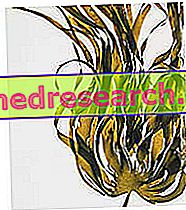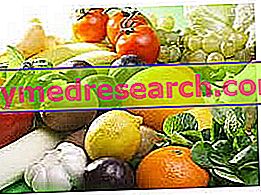See also: chlorella alga and dunalilella alga - Green algae - Red algae - Brown algae -
Kelp and Kombu: What are they?
With the generic name " Kelp " are sold brown algae belonging to the genus Fucus and Laminaria, whose edible part is often called " Kombu ". For this reason the two terms can be used as synonyms.

Indications and properties
In the kitchen
The dietetic-healthy applications of Kelp seaweed are numerous and mainly addressed to the restorative, slimming and laxative sector. These algae are in fact used to flavor dishes and in particular soups, legumes and soups (a widespread custom in the eastern regions of Asia). It is not a coincidence that the kombu, obtained mainly from Laminaria Japonica, represents an excellent source of glutamic acid; from this amino acid the monosodium glutamate is obtained, a powerful flavor enhancer that interacts with specific taste receptors producing umami (the "fifth flavor").
Food supplements
In the food supplement sector, Kelp algae are particularly known for their richness in iodine, an essential mineral on which the correct activity of the thyroid depends. This substance is in fact incorporated into the thyroid hormones and its reduced food intake causes a disease known as endemic goiter (hypothyroidism).
Because of their generous iodine content, the kelp and kombu brown algae are used to stimulate the thyroid gland, in the often mistaken belief that being overweight is attributable to a "too slow metabolism". In fact, since the extensive use of iodized salt has been introduced, cases of hypothyroidism due to food shortages have significantly decreased.
Furthermore, if there is a proven iodine deficiency these supplements should be taken with extreme caution and under strict medical supervision.
NATURAL LAXATIVES
Polymers such as ficocolloids and alginic acid, which possess gel-like properties similar to pectin, are also found in kelp and kombu algae. For this reason, when taken with water, the brown algae extracts have an excellent satiating and laxative power.
Side effects
Iodine overdose causes hyperthyroidism, thyroid dysfunction, tremors, irritability, hot flushes, tachycardia, insomnia and arterial hypertension. The use of brown kelp and kombu algae is also contraindicated in pregnancy, during lactation, in children under 12 years of age and in the presence of heart disease and hypertension.



